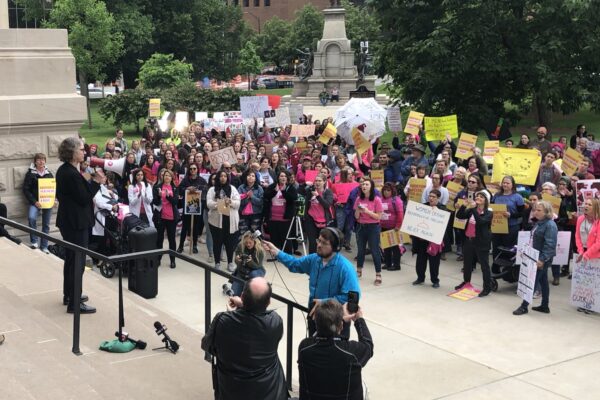There is no doubt that May was deterring for pro-choice advocates across the country. In some states, such as Alabama and Louisiana, politicians pushed through laws that ban most abortions. In others, politicians are doing everything they can to shut down the health centers that many women rely on for basic reproductive health services, including abortion access. Nevertheless, Americans have come out in large numbers to protest these restrictions, and thousands of women have come forward to share their personal stories using hashtag #youknowme.
These attacks are the most recent front in the Trump-Pence administration’s war on abortion, which has enabled ideologues to push the same agenda at the state level. In the midst of this wildfire, Indiana is making national headlines for attacking Hoosier’s reproductive rights. The Supreme Court issued a mixed ruling, involving two Indiana abortion restrictions challenged by the ACLU. The first restriction would have criminalized an abortion if the woman decided to end the pregnancy because of a fetal diagnosis, or based on the sex, race, national origin or ancestry of the fetus. The ban was ruled unconstitutional in the lower courts, and the Supreme Court upheld those decisions when it declined to review. The court’s decision upholds a woman’s right to decide to have an abortion, no matter the reason.
The second restriction requires embryonic and fetal tissue from an abortion or miscarriage to be buried or cremated. While the Seventh Circuit held that law unconstitutional, the Supreme Court reversed that decision, allowing the law to go into effect. Laws like Indiana’s are part of a nationwide strategy to harass, criminalize and intimidate women and abortion providers. Whether it’s through outright bans or restrictions designed to shut down clinics, anti-abortion politicians are utilizing their power to stigmatize and push abortion out of reach.
Through these restrictions, Indiana officials have continuously attempted to chip away at women’s access to reproductive healthcare. Lawmakers across the country are passing medically unnecessary restrictions that burden providers to the point of forcing them to shut down.
Missouri – one of the most recent states to follow a wave of laws that criminalizes abortion at eight weeks of pregnancy – is attempting to shut down the only abortion provider in the state. The state has refused to renew Planned Parenthood of St. Louis’ license, and a judge will soon decide the fate of the clinic. Missouri would become the first state in the United States without a health center that provides abortions since 1974. This is a direct result of a multi-year effort by anti-abortion politicians to undermine Roe v. Wade and restrict abortion access across the country. Like Missouri, Indiana officials are attempting to restrain women’s access to reproductive healthcare – paving the way to eliminate abortion access one bill at a time.
Abortion is still a legal right in every state across the country. But politicians don’t have to overturn Roe v. Wade to restrict a woman’s access to abortion. Shutting down abortion clinics, and limiting access to reproductive healthcare is contrary to what the majority of Americans support. When abortion care is unavailable, the harm falls hardest on those struggling financially or those who already face significant barriers to healthcare. It is clear this battle is just gearing up, and the ACLU will continue to fight to ensure all Hoosiers have safe access to reproductive care.

